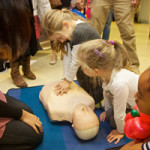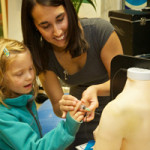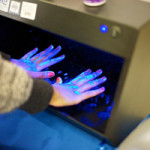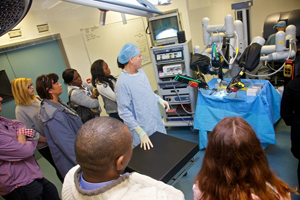St George’s opens its doors for the 2012 Community Open Day
On Saturday, 13th October, St George’s University Hospitals NHS Foundation Trust and St George’s, University of London opened their doors to members of the public for the 2012 St George’s Community Open Day.
Members of the community of all ages were invited to take a behind-the-scenes glimpse at the workings of a busy NHS hospital and university. The day showcased around 40 of the hospital’s departments, including neurosciences, cancer, maternity services and integrated falls and bone health.
University researchers were on hand to speak about their pioneering projects into new medicines and treatment, while student ambassadors provided practical demonstrations of bandaging skills, blood pressure monitoring and prosthetic-finger making.
Over 200 people enjoyed guided tours of one of the hospital’s operating theatres, CT scanner and the simulation unit, while many took a step back in time to learn more about the history of St George’s.
As well as all the science and healthcare activities, family entertainment included face painting, balloon modelling and dance workshops.
Professor Peter Kopelman, principal, St George’s, University of London, said: “It was a real privilege to show so many people what we do at St George’s, and provide an opportunity for them to have a practical experience of the many aspects of modern day medicine and healthcare.”
Miles Scott, chief executive, St George’s University Hospitals NHS Foundation Trust, said: “My thanks to everyone who came along and I hope that everyone enjoyed themselves. I look forward to future events celebrating both the trust and university.”
- The pathology stand offered a closer look at chromosome
- University students taught visitors basic life-saving skills
- Specialists in conditions affecting the joints demonstrate today’s therapies and discuss how their research is advancing treatment
- Visitors were able to check the cleanliness of their hands at the infection control stand
Notes to editors
High resolution images available on request.
For more information, please contact the Communications Unit on 020 8725 5151 or email communications@stgeorges.nhs.uk. Outside working hours, please page us by calling 0844 822 2888, leaving a short message and contact details for pager SG548.
About St George’s Healthcare NHS Trust
- St George’s University Hospitals NHS Foundation Trust is one of the largest healthcare providers in southwest London. Its main site, St George’s Hospital in Tooting – one of the country’s principal teaching hospitals – is shared with St George’s, University of London, which trains medical students and carries out advanced medical research. As well as acute hospital services, the trust provides a wide variety of specialist and community hospital based care and a full range of community services to children, adults, older people and people with learning disabilities. These services are provided from Queen Mary’s Hospital, Roehampton, 11 health centres and clinics, schools and nurseries, patients’ homes and Wandsworth Prison.
- St George’s Hospital, Tooting, is one of London’s four major trauma centres. In 2011/12 the emergency department at St George’s Hospital treated an average 447 patients each day, with 95.06 per cent of patients being admitted, transferred or discharged within four hours.
- St George’s Hospital is one of eight hyper acute stroke units in London. The trust’s stroke services were rated as the best in the country by the National Sentinel Audit 2010, and in the top four in 2011.
- St George’s Hospital has one of the biggest and busiest of the eight heart attack centres in London. The heart attack centre at St George’s Hospital was rated as having the best response rate for treating heart attack patients in London in the 2012 Myocardial Ischaemia National Audit Project (MINAP).
- The trust is an accredited centre of excellence for trauma, neurology, cardiology and cancer services, and the national centre for family HIV care and bone marrow transplantation for non-cancer diseases.
About St George’s, University of London
- St George’s, University of London (SGUL), established in 1733, is distinctive as the UK’s only independent medical and healthcare higher education institution. It benefits from strong links with the healthcare profession, including a shared site with St George’s University Hospitals NHS Foundation Trust in Tooting, south west London.
- SGUL is dedicated to the education and training of doctors, nurses, midwives, physician’s assistants, paramedics, physiotherapists, radiographers, social workers, healthcare and biomedical scientists. It attracts around 6,000 students, some of whom are taught in conjunction with Kingston University.
- Research at SGUL has a UK and international focus and aims to improve prevention, diagnosis and treatment of disease in areas including infection and immunity, heart disease and stroke, and cell signalling. It also aims to enhance understanding of public health and epidemiology, clinical genetics, and social care sciences. www.sgul.ac.uk






